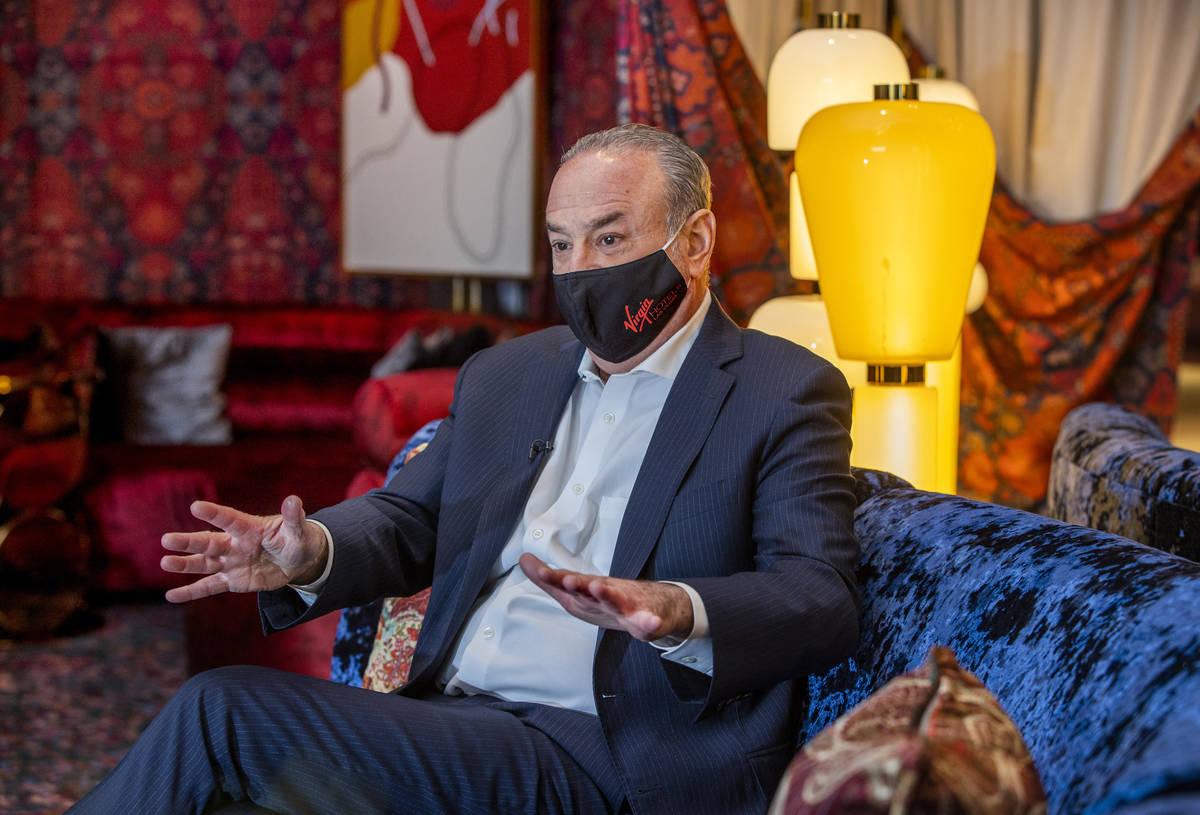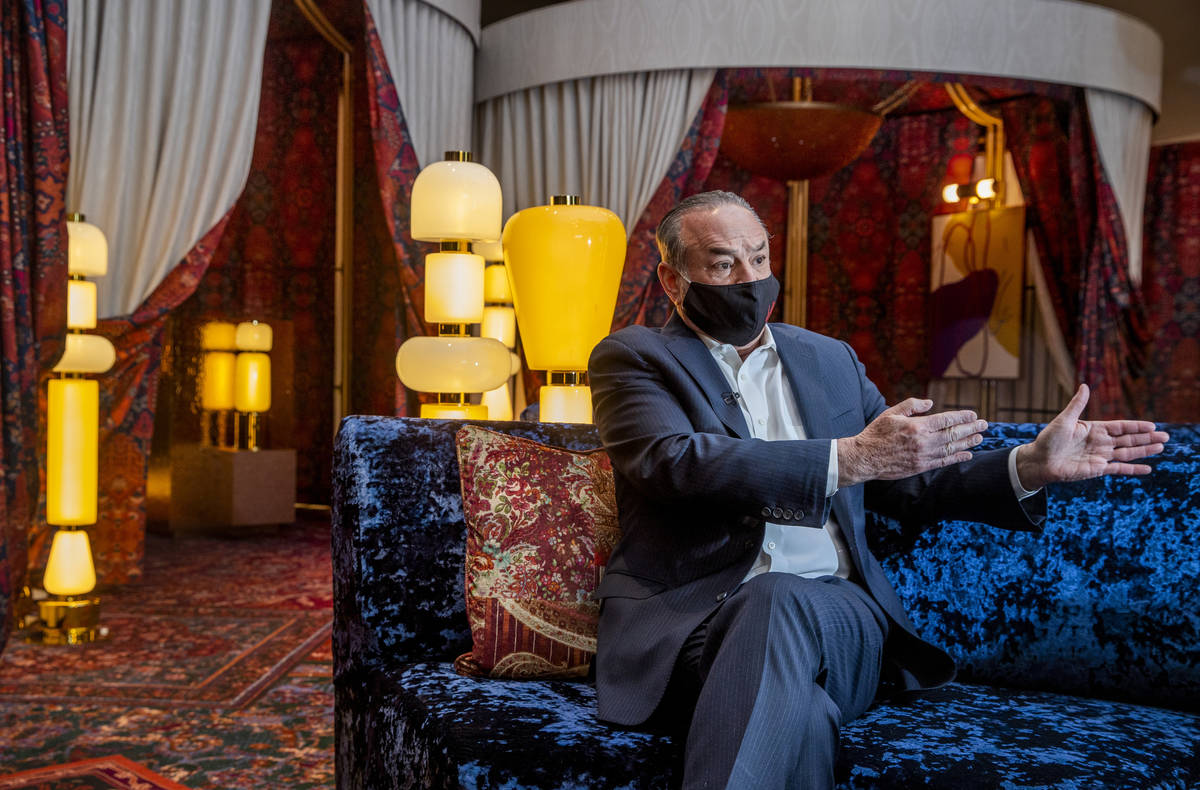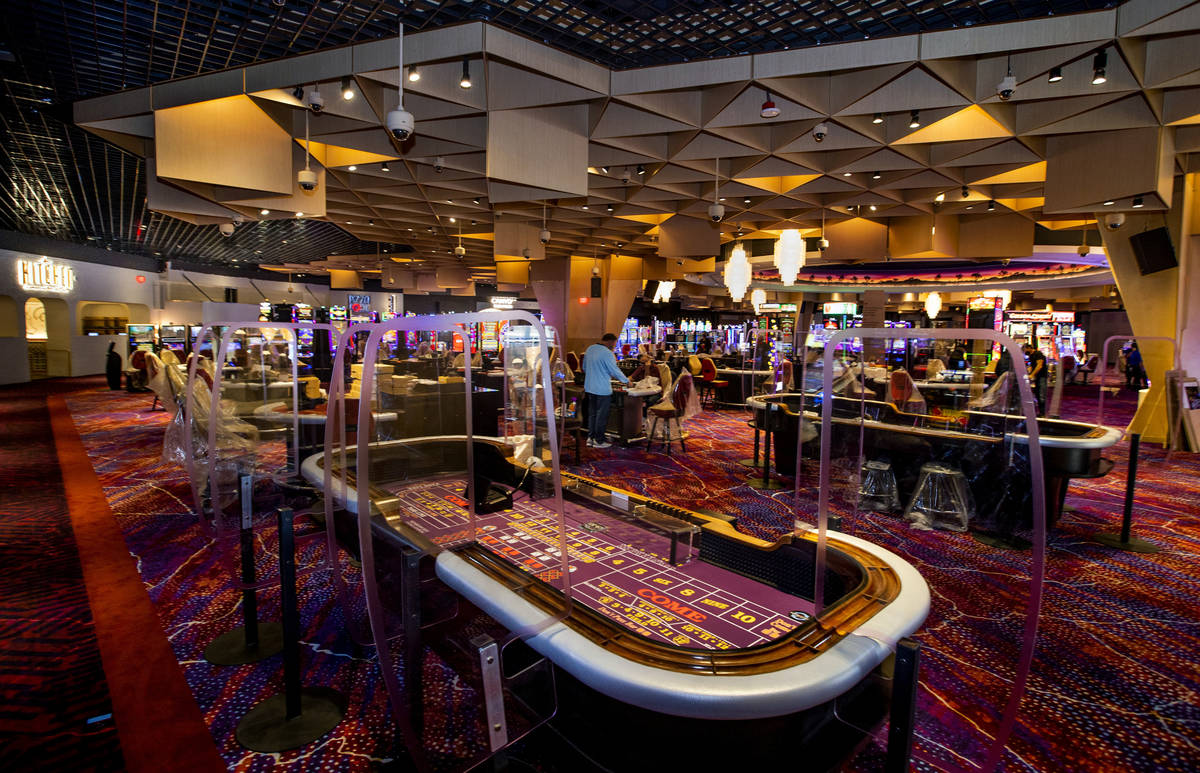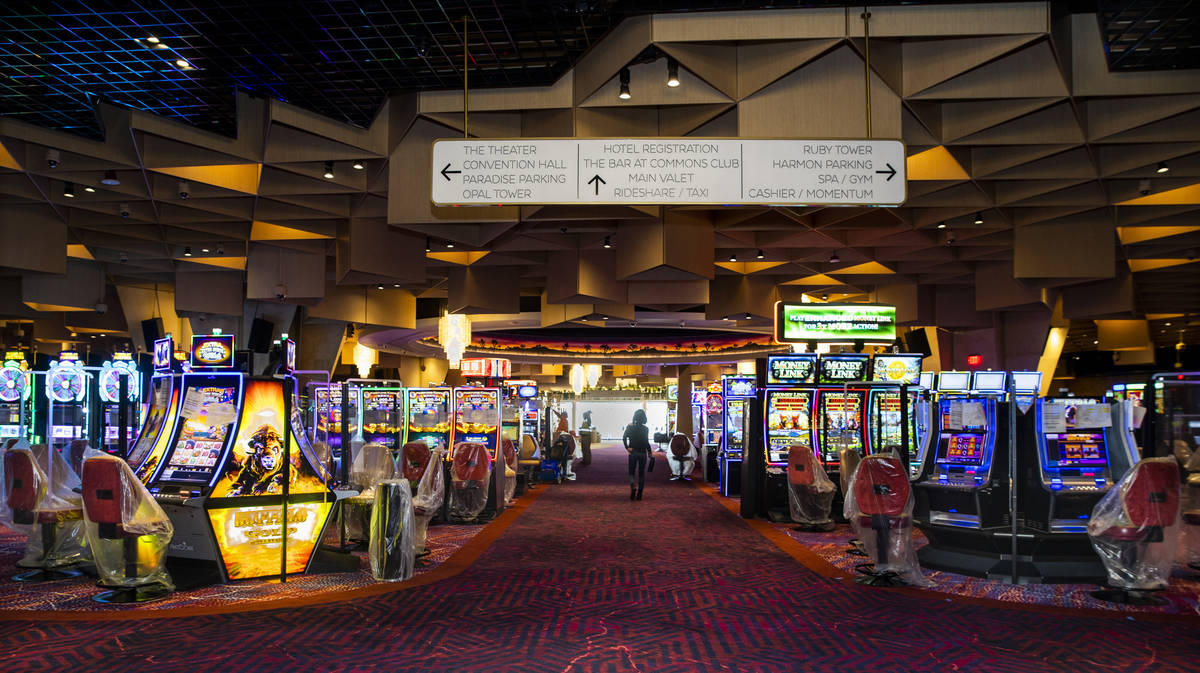Virgin Hotels CEO talks about making $200M renovation during pandemic
At a partylike news conference with thumping music and swimsuit-clad women dancing on platforms in the pool, Richard Branson made a flamboyant entrance as Las Vegas’ newest casino competitor.
Branson, founder of the Virgin Group conglomerate, and partners had bought the Hard Rock Hotel and announced plans to overhaul it into a Virgin-branded resort. At the event, the British billionaire said the new owners would “bring some magic back” to the roughly 1,500-room property a mile east of the Strip.
Virgin Hotels Las Vegas is now set to debut almost exactly three years after the sale was unveiled March 30, 2018 — and, over the past year, after the coronavirus pandemic turned life upside down, devastated Southern Nevada’s economy and prompted management to delay the resort’s opening twice.
Virgin, which was previously scheduled to debut in fall 2020 and then Jan. 15, is slated to open Thursday after its roughly $200 million transformation from the Hard Rock.
Richard “Boz” Bosworth, president and CEO of the resort’s ownership group, spoke with the Review-Journal on Monday about the purchase, the renovations and the pandemic.
The interview was edited for length and clarity.
What initially got you and your partners interested in buying the Hard Rock?
When we knew there was an opportunity to acquire the Hard Rock, and we knew that a transformation was in mind for us, it hit all the boxes for us — appropriate level of convention and event space, the ability to change and improve and increase the size of the casino, a new ecosystem of food and beverage, transformable hotel rooms. To build a resort in this town, with all the amenities that you have to have, is approximately $1.25 million to $1.5 million per key. To acquire an existing asset and transform it, you can do that for significantly less.
Why go with the rebranding as opposed it to keeping it as the Hard Rock?
The Hard Rock is a wonderful brand and a highly successful brand, but we felt that Las Vegas needed something different at this location. The Hard Rock had been here for 25 years, had faced significant competition over the years once the Palms had been built, and then Cosmo, and CityCenter, and it wasn’t quite the attraction that it had been when Peter Morton so successfully not only developed the Hard Rock but changed so much of what a casino resort business is all about. But that started to wane, and that happens after 25 years.
Take me back to February of 2020 when you locked the doors to the Hard Rock. What were the feelings that you and your team had, and at that point, had you even heard of the word coronavirus?
We made the decision to close the doors completely about a year earlier, nine months earlier. In order to mitigate risk and really renovate this property, without interfering with customers, we felt that we needed to shut it down. That was a big gut check to take an operation like the Hard Rock and say, ‘We’re not going to phase it, we’re going to give up all that cash flow,’ but it’s got to be the way to do it in order to grow this business in the future.
We had heard of COVID by then. I think we knew it was going to impact international travel, that there had to be very well-managed sanitation practices in place, that if somebody was not feeling well, we needed to send them home, that this was not going to be something that was going away quickly. We were watching how the hotel industry was reacting to this worldwide. When we shut down, we didn’t know that we were going into a pandemic and an economic shutdown, but we did know that we were not facing a short-term issue.
When did you start to realize, holy crap, this is going to be big, not only for Vegas but potentially for your project?
I’ve lived on the Las Vegas Strip since 2016. When I started seeing traffic disappear on the Strip shortly after we closed down, when I started seeing room rates falling and hotel occupancy, particularly in midweek, starting to fall, when we started to hear rumblings that conferences were starting to cancel, we realized there was going to be a rough year in front of us for not only Las Vegas but the entire industry.
It never impacted your overall construction timeline, right?
It did not, although we had to put the very typical safety protocols in place. And as you recall, because I remember seeing headlines in the Review-Journal, it was headline news to have a single construction worker have COVID in March and even into April. We did not have our first case of COVID detected by one of our construction team members probably until June. By that time, having one was not headline news, but you certainly had contact tracing, we had to clear floors, we had to bring in environmental cleaning. Where we ended up not completely dodging the bullet was with supply chains. Even today, as you walk around the property, you’re still seeing some furniture, fixtures and equipment being placed down, and that was generally because of the backlog either coming out of Asia or Europe on manufacturing, or the inability to get through customs in Long Beach, Houston or New York.
Do you know how many construction workers here contracted COVID?
I would say that between construction workers and team members, it was less than 20. At any given time, we had 450 to 650 team members and construction crew members here.
Before the casinos were allowed to reopen in early June, what were your thoughts when you saw all these closed resorts and hardly anybody walking around the Strip?
All these people are out of work, the entire hospitality industry. To know that there were so many people who were put out of work overnight, it was shocking. Our team members had about a year’s notice that we were going to shut down. We had the Stick Around and Come Back program, which guaranteed all of our employees a recall to come back to their position without interviewing for a new job once we reopened. We gave them a retention bonus, we paid them out all their personal time-off, and they were able to collect unemployment. Our team members were ahead of the curve as it relates to organizing their lives and having plenty of notification that they were going to be out of work for a period of time, and they were able to get into the unemployment system way before the onslaught that occurred.
As I’m sure you recall, former Drew Las Vegas owner Steve Witkoff suspended construction of the project last March. Was that something you thought about doing?
Not once. We were fully funded. We had raised all our capital before the closing of the property. Our design had been completed, our contractors were in place, we were closed anyhow, and we did have the belief that at some point the world would return to normalcy, and when it did, we would be ready to open.
When did you realize that the fall 2020 opening was not realistic and that you’d have to push it back?
I started getting nervous about that in July and August. When we started having some supply chain issues, and I started to see the infection rates increase, I started to think we might have an issue here. We could have opened on Jan. 15, but it just seemed completely unsafe for everybody to be here. Just prior to Thanksgiving, casino capacity dropped to 25 percent.
Could you have even turned a profit at 25 percent capacity if you went ahead with the January opening?
No. It was too small. The March 25 date was no accident for us. We were hopeful that we would be able to get back to the 50 percent capacity level sometime in March. We were starting to see improvements in the marketplace. Hotel rates were starting to return, and we wanted to reopen this property as the market was reopening, and hopefully make our own little contribution to the community by generating some excitement and some new traffic, as generally happens when new resorts open.
Contact Eli Segall at esegall@reviewjournal.com or 702-383-0342. Follow @eli_segall on Twitter.


























